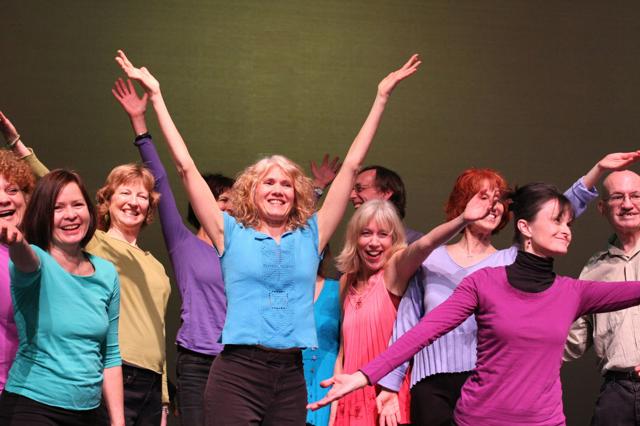Hand Me Down, Bestowing Our True Inheritance Through Life Lessons and Legacy, a production by the Community Choreography Project, is a collage of personal stories woven around themes of “home” and “legacy.” As Barrie Barton, choreographer of the production, puts it: Hand Me Down is a showcase of movement theater that strives to “take artistic expression away from the experts and give it back to all of us.”
The theme for the show was inspired after Barton left her job of 22 years, working as a dance teacher with Buncombe County Schools, and after she turned 50. “It seemed like a time to look at what I had contributed to my community,” she says, reflecting on the thought that set her fourth community production into motion.
Working closely with a cast of 16 — with actors ranging from age 34 to 64 — Barton asked everyone to consider a set of questions: Where do you come from? What is home? What do you carry through this world? What do you hope to leave behind? From here, a community dialogue was sparked — providing a foundation for the production as a whole.
Creating an original score as a team, and thinking deeply about these questions, however, is no easy task. For the past seven months, the cast has been hard at work examining these ideas through creative writing, conversation and free-form movement, trimming material down as they go and pairing it with expressive dance and spoken-word/prose poetry.
“Legacy,” for example, explores the meaning of names. “There is a lot of significance around our names,” says Barton. “Some people are juniors and some are seniors; some people are given a family name. I’m Jewish, so I was given a Hebrew name. Names are changed when we marry and when we divorce.”
As she speaks, Barton looks to a dancer moving through the rehearsal space at Jubilee Community Church. The dancer lifts her arms quickly and lets them fall slowly back to her side. “This woman has gone through multiple divorces, and talks about her family tree as if it’s been hit by lighting — splitting into all these [fractured] sections,” Barton says. “But, when you sew all of these stories together, it [creates a] quilt, a beautiful collage of stories.”
The hope is that audience members will recognize a piece of their life story, home or legacy when watching these vignettes. As Barton says of her experience guiding this production: “People have these stories — these experiences in their life that they think only happen to them, and there’s this liberating feeling when realizing they are not alone.”
The production also benefits from the compelling stories of each individual in the cast. “My [contribution to the piece] is quite different from most everyone else’s,” says Monika Wengler, who will be performing in “Legacy.” “What I have been working with is coming here from a different country, and dealing with my country’s Nazi history. There is a part in the piece that we call ‘The Buck Stops Here,’ [about] things that we don’t want to pass on. For me, this has been a dual piece; I don’t want to be seen as a Nazi anymore, just for being German; and I also always want to work so that this [history] never ever happens again. That’s what I’m bringing with me, and what I’m working towards.” Wengler’s line in the production is: “I come from generations divided and destroyed by wars and I live according to my father’s advice, ‘Never follow a flag.’”
Cynthia Greenfield, working beside Wengler, will deliver this line about her legacy: “From the quiet prayerfulness of my grandma’s hands dancing circles over Sabbath candles, I light my candles now…” Greenfield smiles and says, “I come from ‘Go to school, get a good job, marry a good Jewish man and have a least two children!’” She shrugs and adds, “The combination of all of us [is what] makes this performance. Each of us is different, but that’s what’s going to call to the audience.”
The third act in Hand Me Down is titled “City Limits,” where Frank Marshall will perform an essay from The Colossus of New York written by Colson Whitehead (which, writes Barton, “resonates with the theme of a sense of place, legacy, loss and identity”). In-between the three main acts (”Home,” “Legacy” and “City Limits”), Tebbé Davis and Amy LaDeroute will present a comedy called “Esther and Bernie,” a short skit about an elderly couple reminiscing about their marriage of 64 years. Daniel Barber will play an original song written about his father, and a slideshow of photos focusing on “visual legacy” will be projected onto the stage.
All proceeds from Hand Me Down will benefit CarePartners Hospice.
Hand Me Down promises to create a space where people can see themselves — their struggles, hopes, aspirations and fears — through the stories and lessons shared by others. “These common themes will unite us,” says Barton. “Here, you come to watch yourself.”
— Aiyanna Sezak-Blatt can be reached at asezakblatt@mountainx.com.
who: Movement-theater performance
what: Hand Me Down, Bestowing Our True Inheritance Through Life Lessons and Legacy
where: Diana Wortham Theatre, 2 S. Pack Square
when: Friday, April 15 and Saturday, April 16, 7:30 p.m. ($15. Info: 257-4530, dwtheatre.com or communitychoreography.com)






Before you comment
The comments section is here to provide a platform for civil dialogue on the issues we face together as a local community. Xpress is committed to offering this platform for all voices, but when the tone of the discussion gets nasty or strays off topic, we believe many people choose not to participate. Xpress editors are determined to moderate comments to ensure a constructive interchange is maintained. All comments judged not to be in keeping with the spirit of civil discourse will be removed and repeat violators will be banned. See here for our terms of service. Thank you for being part of this effort to promote respectful discussion.